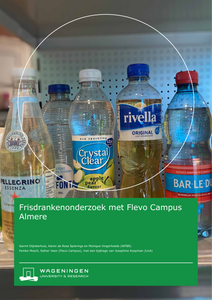This interactive session showed partipants the powerful combination of artbased and service design methods in developing sustainable cultural tourism
DOCUMENT
Het lectoraat Facility Management van Zuyd Hogeschool (14.000 studenten in Heerlen, Maastricht en Sittard) richt haar pijlen op praktijkonderzoek op 3 thema’s: Leegstand en herbestemming, leefbaarheid en circulaire inkoop. De keuze voor het onderzoeksthema ‘leegstand en herbestemming’ ligt voor de hand in een regio waar sprake is van demografische krimp, ontgroening en vergrijzing en er dus steeds meer publiek vastgoed leeg komt te staan. In dit artikel hanteren we de omschrijving van Marc van Leent (2012) om publiek vastgoed te duiden: Vastgoed dat initieel een publieke functie diende. Scholen, zorg gebouwen, kerken en cultuurhuizen vallen daarmee onder deze categorie. De vraag of het gebouw met privaat of publiek geld is gesticht, is in dezen dus van minder groot belang. Om de koppeling met de praktijk te versterken heeft het lectoraat Facility Management de samenwerking gezocht met Yask Facility Management. Zowel het literatuuronderzoek als het praktijkgedeelte heeft het lectoraat samen met Yask uitgevoerd. Een Master FREM studente uit 2017-2018 heeft de lead genomen bij het praktijkgedeelte en de symbiose tussen theoretische inzichten en praktijkervaringen voor haar rekening genomen, hetgeen uitmondde in haar Master FREM thesis: “Redevelopment approaches for vacant public real estate in the Netherlands”. Dit artikel beschrijft de aanleiding, het proces, de onderzoeksresultaten en de conclusies die daaraan verbonden zijn.
DOCUMENT

Het onderzoek beschreven in dit rapport is een samenwerking tussen Flevo Campus en WFBR. Flevo Campus wil dat de consumentenkeuze voor frisdranken een meer bewuste en gezondere keuze wordt, niet alleen gedreven door nutriënteninformatie en prijs, maar ook gedreven door smaakbeleving en fun. Dit onderzoek belicht een aantal verschillende aspecten van frisdrankconsumptie door consumenten, gebaseerd op een: 1. inventarisatie van smaakprofielen in gebruik bij andere dranken, 2. literatuurstudie over de perceptie van verschillende soorten frisdrank, 3. historisch onderzoek 'frisdrank als cultureel symbool', 4. consumentenstudie onder 30 consumenten in Almere naar de groepering van verschillende soorten frisdrank, 5. online consumentenstudie naar de groepering van verschillende soorten frisdrank onder 164 consumenten.
DOCUMENT

The objective of this paper is a reflective discussion on the validity of the construct Information Literacy in the perspective of changing information and communication technologies. The research question that will be answered is: what is the impact of technological developments on the relevance of the Information Literacy concept? Technological developments that will be discussed are: - content integration (federated search engines) - amateur publishing (user generated content) - use of social networks to find information - personalisation and push technology - loss of context / fragmentation of information. Research methods: desk research and critical analysis of the results that were found. The analysis of the influence of the discussed technologies on the Information Literacy concept is represented by arrow diagrams. Findings: The Information Literacy concept refers to a set of sub skills varying from retrieval skills to critical use of scholar information. Changing technologies reduce the significance of the more instrumental sub skills of the Information Literacy concept. On the other hand, higher order cognitive skills (for instance critical evaluation of resources and analysis of content) become more and more important for students and professionals who try to solve their information problems. The paper concludes with a description of the facets of the Information Literacy concept that need extra attention in the education of the knowledge workers of the future. [De hier gepubliceerde versie is het 'accepted paper' van het origineel dat is gepubliceerd op www.springerlink.com . De officiële publicatie kan worden gedownload op http://www.springerlink.com/content/n32j3um878720h40/abstract/]
DOCUMENT

Based on the theory of embodied cognition we developed NOOT, at tangible tool that allows marking audio-moments during creative sessions. A detailed analysis of using NOOT in practice lead to a reconceptualization of NOOT within processes of external scaffolding. It also spurred a new design project focused on reflection during group sessions
DOCUMENT
